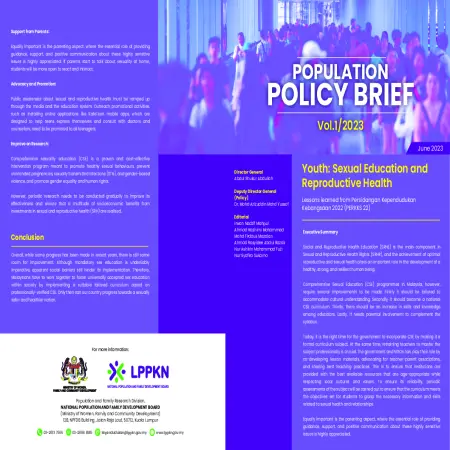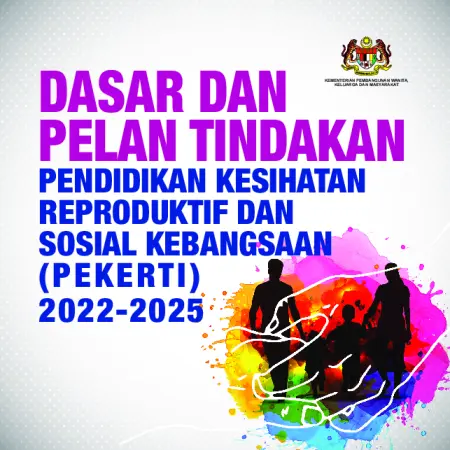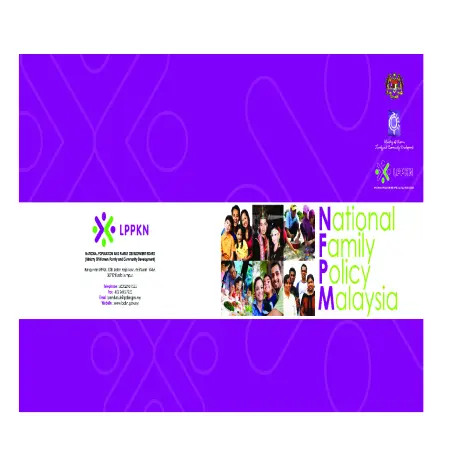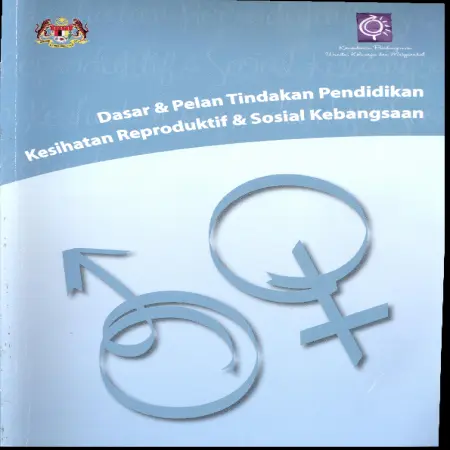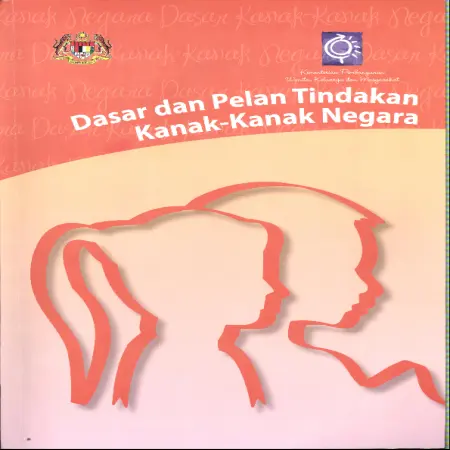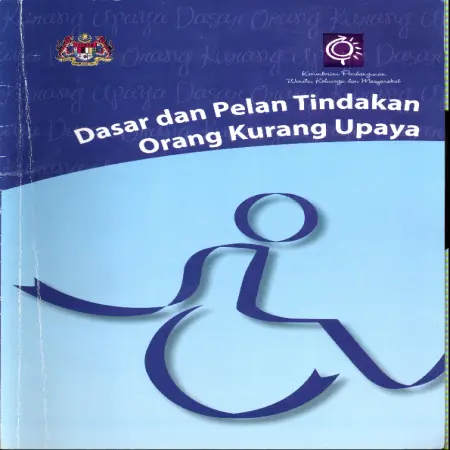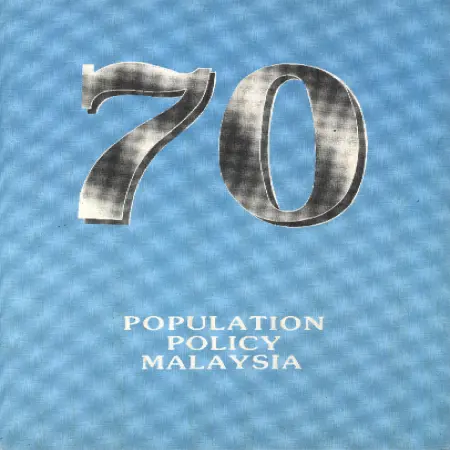Browse by Type
Results for Item type : "Act & Policy"
|
|
Population Policy Brief: Youth Sexual Education and Reproductive Health
Item Type: Act & Policy
Editor:
Year: 00/06/2023
Abstract: Comprehensive sexuality education (CSE) is a proven and cost-effective intervention program meant to promote healthy sexual behaviours, prevent unintended pregnancies, sexually transmitted infections (STIs), and gender-based violence, and promote gender equality and human rights. Therefore Malaysian have to work together to foster universally accepted sex education within society by implementing a suitable tailored curriculum based on professionally-verified CSE.
|
|
|
|
|
|
Dasar dan Pelan Tindakan Pendidikan Kesihatan Reproduktif dan Sosial Kebangsaan (PEKERTI) 2022-2025
Item Type: Act & Policy
Editor:
Year: 08/09/2022
Abstract: This new PEKERTI policy is applicable to every individual regardless of age and gender and takes into account ethnic, religious and cultural diversity. Focus will be given to producing a healthy population in terms of reproductive and sexual health based on high moral values and practicing responsible behavior and mutual respect for each other.
This PEKERTI policy has been streamlined to achieve 5 objectives which are to (i) increase the awareness of Malaysians regarding the importance of reproductive and social health education, (ii) develop evidence-based reproductive and social health education programs, (iii) develop human expertise and modernity in aspects reproductive and social health education, (iv) carry out research in aspects of reproductive and social health education and (v) ensure programs and services under this policy are continuously monitored and evaluated.
In order to achieve these 5 objectives that have been set, 5 Cores have been identified as policy implementation machinery namely (i) Advocacy, Promotion and Prevention, (ii) Comprehensive Reproductive and Social Health Education Covering All Age Levels, (iii) Human Capital and other Resources for Reproductive and Social Health education, (iv) Research and Development and (v) Monitoring and Evaluation.
|
|
|
|
|
|
National Family Policy
Item Type: Act & Policy
Editor:
Year: 00/03/2011
Abstract: Malaysia is one of the few countries that has an explicit policy on family. The National Family Policy (NFP) was launched on 19 March 2011. It advocates the concept of family wellbeing based on family values such as caring, honesty, justice and equity regardless of status, gender and age. At the macro level, the policy will be the catalyst to urge all stakeholders to take into account the family perspective in all their planning, strategy formulation or development efforts, either through their commitment, formulation or review of policies and laws that are not family friendly to ensure that programmes, services and family friendly facilities are accessible.
|
|
|
|
|
|
Dasar & Pelan Tindakan Pendidikan Kesihatan Reproduktif & Sosial Kebangsaan
Item Type: Act & Policy
Editor:
Year: 06/11/2009
Abstract: The National Reproductive and Social Health Education Policy that applies to all walks of life regardless of age, to increase the knowledge on sexual reproductive health among Malaysia and to encourage them to have a positive attitudes towards reproductive and social services.
Earlier it was known as PKRS Policy. However, in 2012, the Policy and Action Plan for National Reproductive and Social Health Education was known as PEKERTI Policy. Reproductive and social health education is fundamental to the development of strong and healthy human development, honorable and mutual respect. The policy takes into account the diversity of religion, culture and values of life in Malaysia.
Following the approval of the Parliament of Malaysia on the Policy and Action Plan for National Reproductive and Social Health Education (PEKERTI) in 2009, LPPKN through KPWKM has implemented the PEKERTI Programme at the kafe@TEEN Adolescent Centres, Program Khidmat Latihan Negara (PLKN), and schools.
|
|
|
|
|
|
Dasar dan Pelan Tindakan Kanak-Kanak Negara
Item Type: Act & Policy
Editor:
Year: 29/07/2009
Abstract: Children are a very important part of society, they are an asset for the country and the link for the country's development in the future. In 2008, there were 10.5 million (37.9%) children out of 27.7 million population. As such, the Government is very concern about the welfare and interests of children. In this regard, Malaysia has ratified the Convention on the Rights of the Child (CRC) on 17 February 1995. The Convention focuses on the welfare and lives of children that lead to aspects of survival, protection, development and participation. As a State Party to the CRC, Malaysia is very concerned and committed to the responsibility to ensure the safety and welfare of the children who are the heirs and future generation of the country. Interests of the child is clearly shown in the Statement of Vision 2020 in which the institution of the family and children is one of the focuses of priority in the country's efforts to achieve developed nation status in addition to creating a society that is fair and compassionate.
|
|
|
|
|
|
Dasar dan Pelan Tindakan Orang Kurang Upaya
Item Type: Act & Policy
Editor:
Year: 21/11/2007
Abstract: People with Disabilities (PWD) policy is based on the concept of equality of rights and opportunities for PWD to participate fully in society. This policy also emphasizes on human rights values such as integrity, honour and independence that will enable them to live independently.
|
|
|
|
|
|
Population Policy Malaysia towards a population of seventy million
Item Type: Act & Policy
Editor:
Year: 00/07/1984
Abstract: Based on this study the present population growth trend indicates that the population of Malaysia will stabilise at or around 39 million by the year 2150. In order to achieve an ultimate population size of 7O million, the present demographic trend has to be changed so that the rate of fertility decline is reduced by 0.1. point every 5 years. In this manner, the target would be achieved within approximately 115 years times, namely around the year 2100.
|
|
|
|





